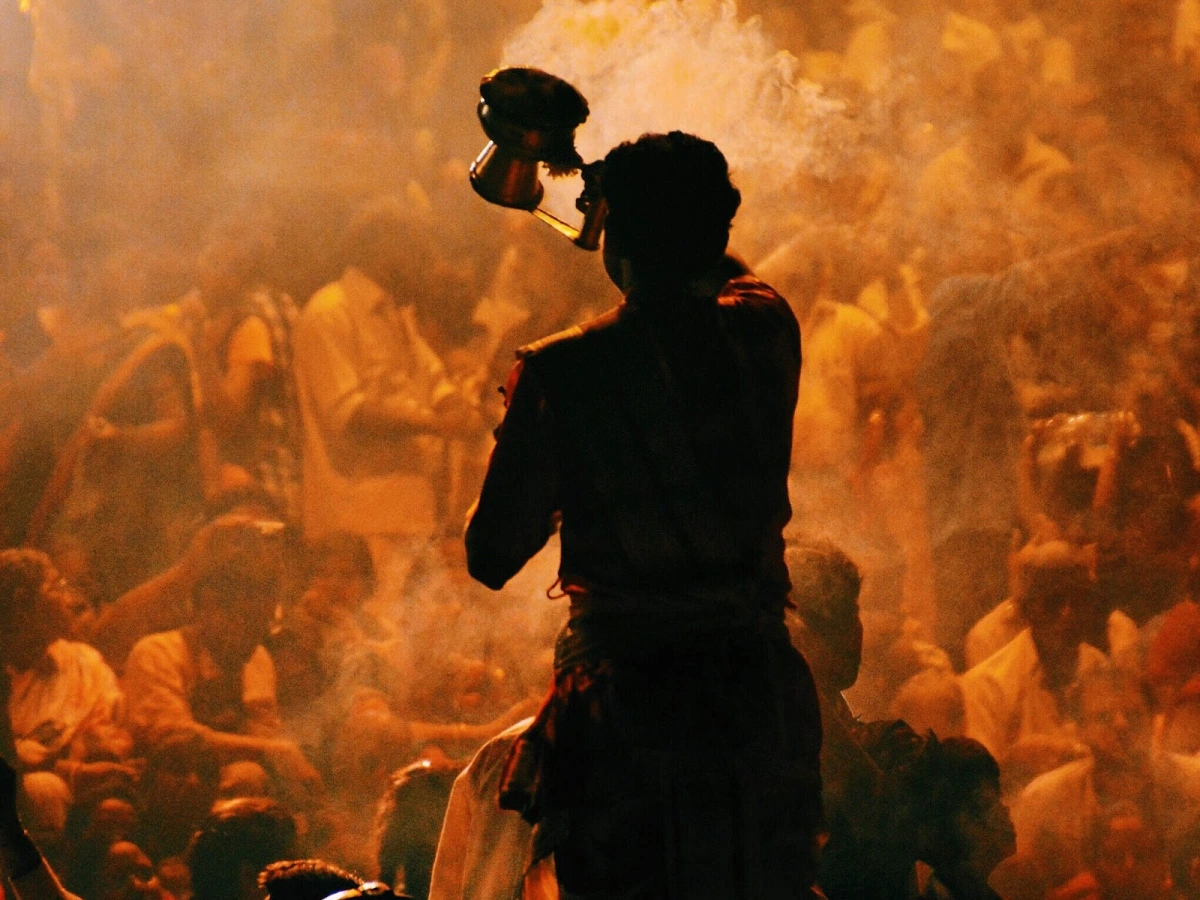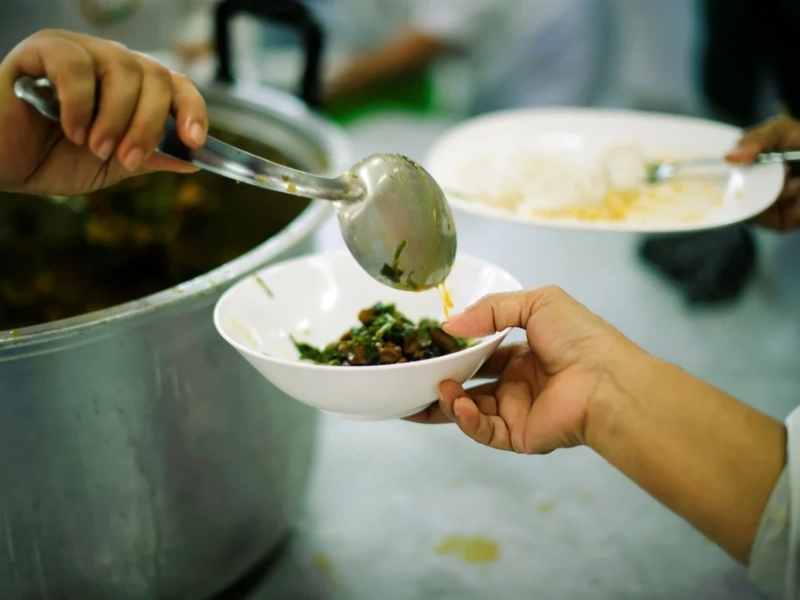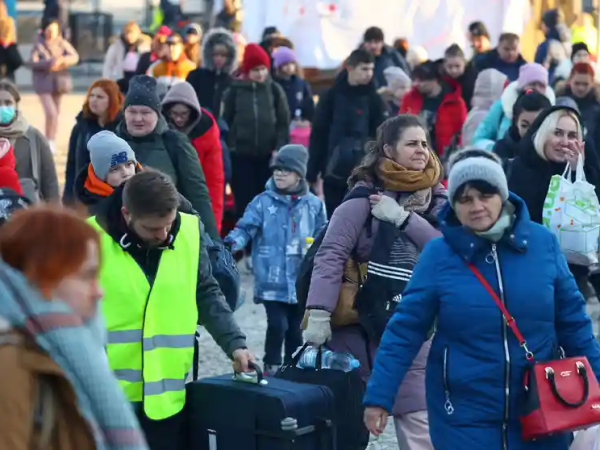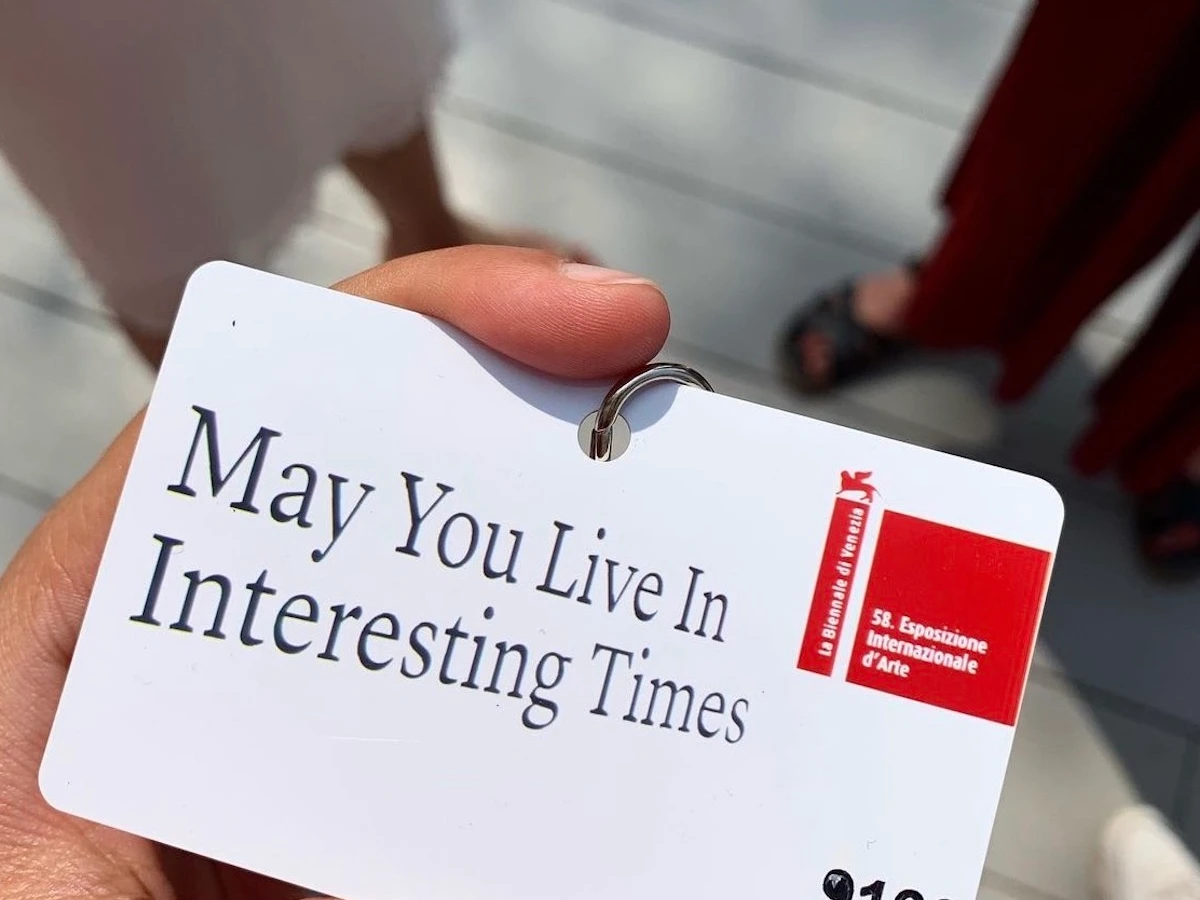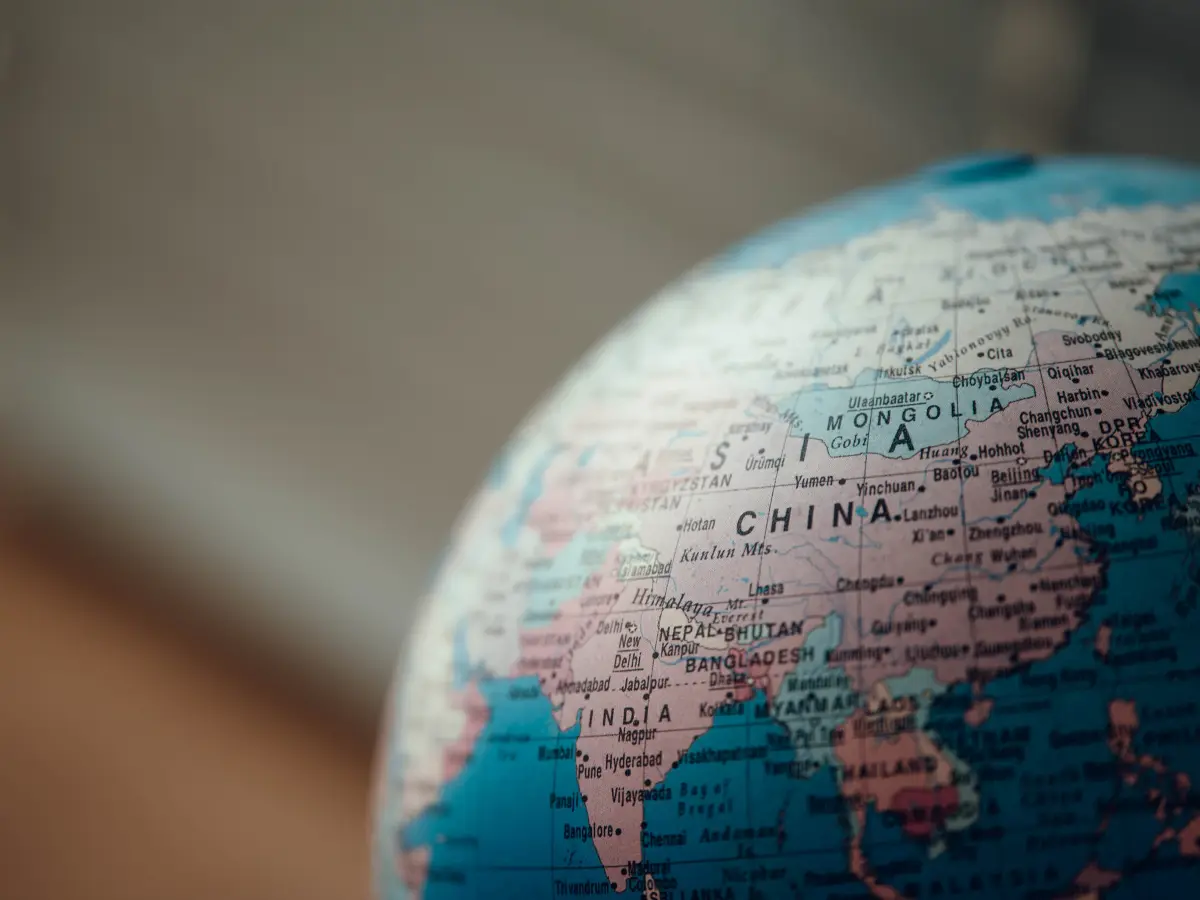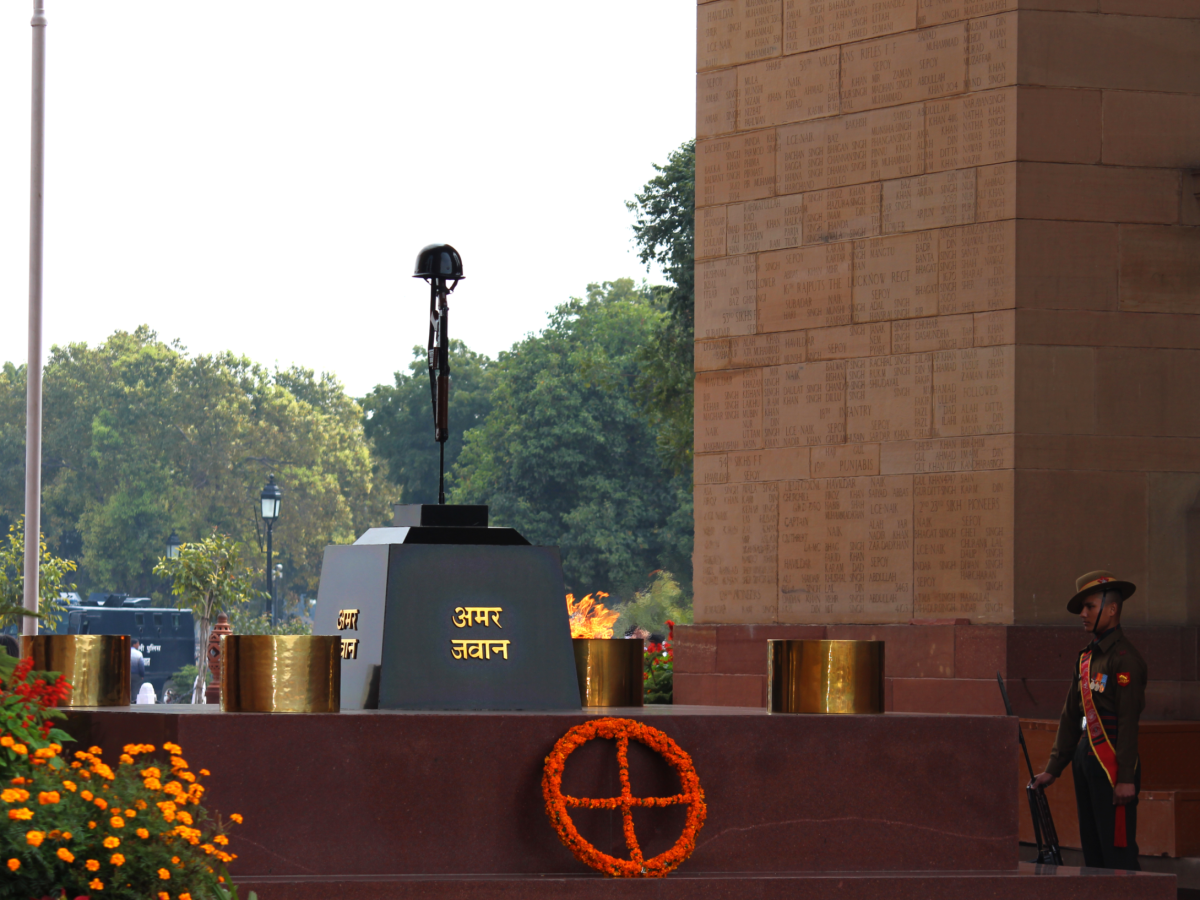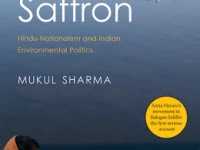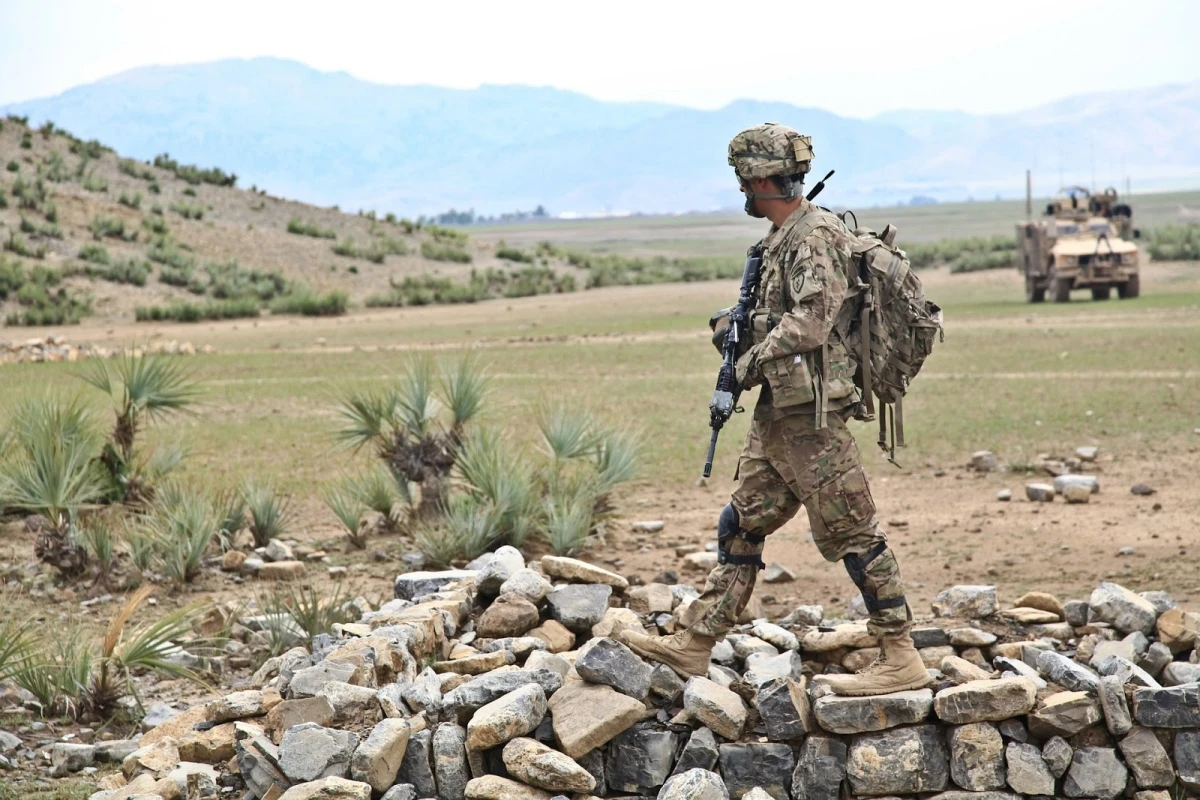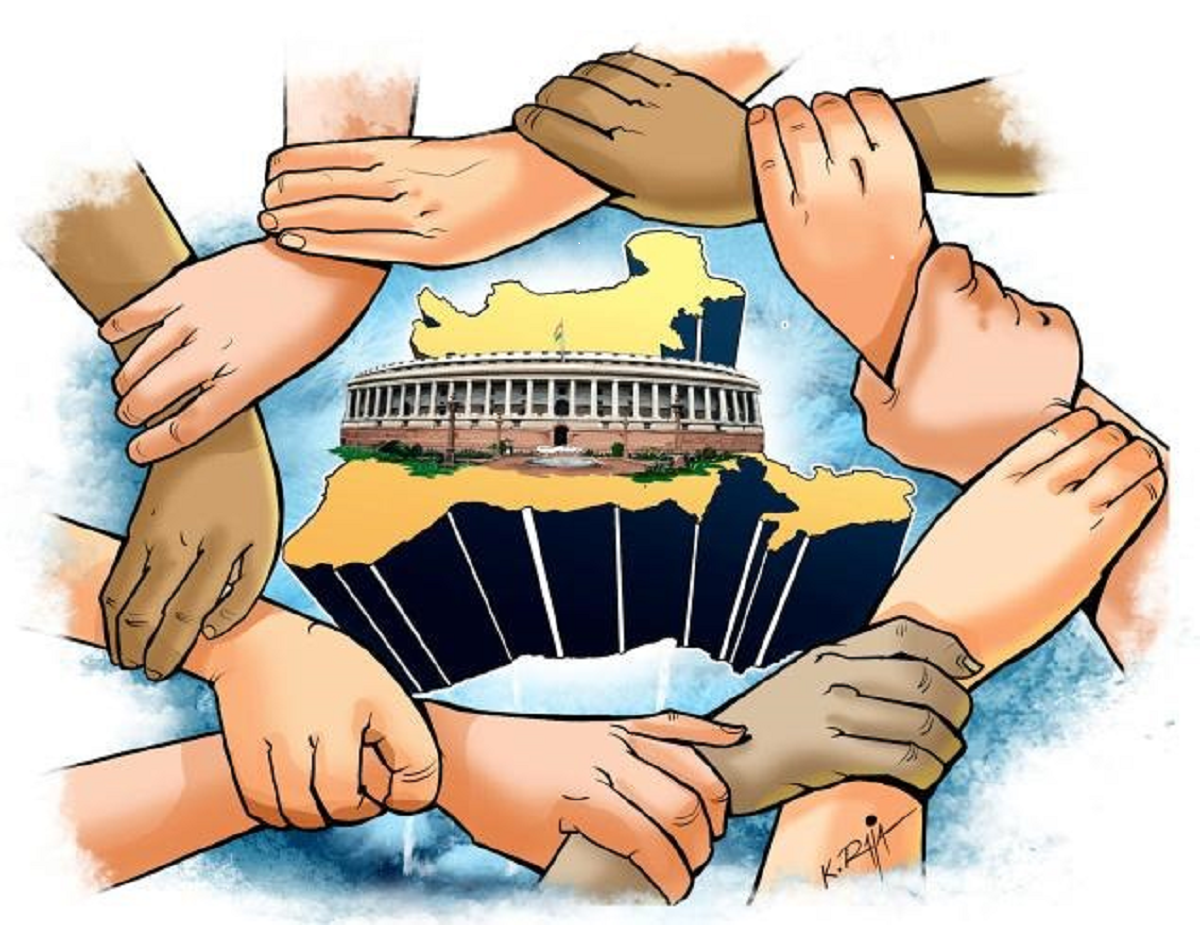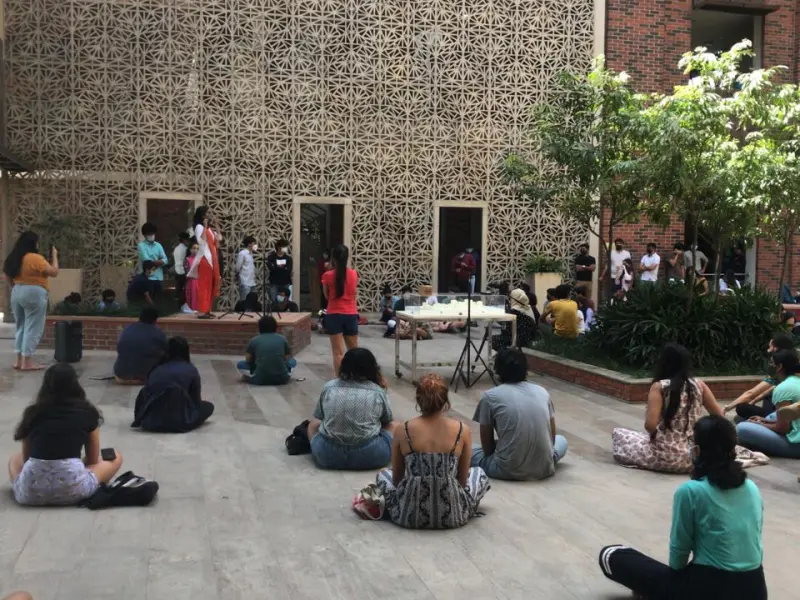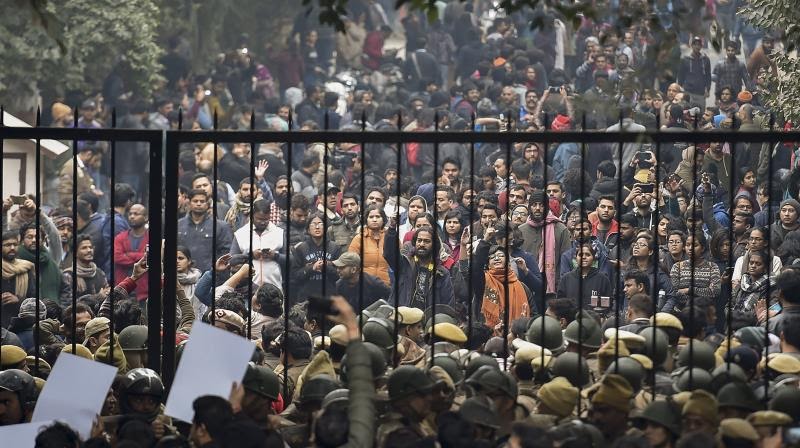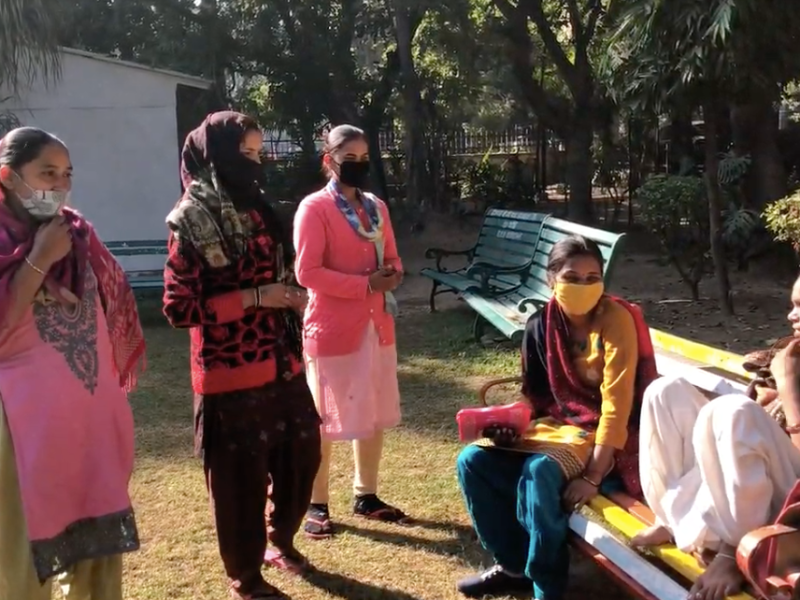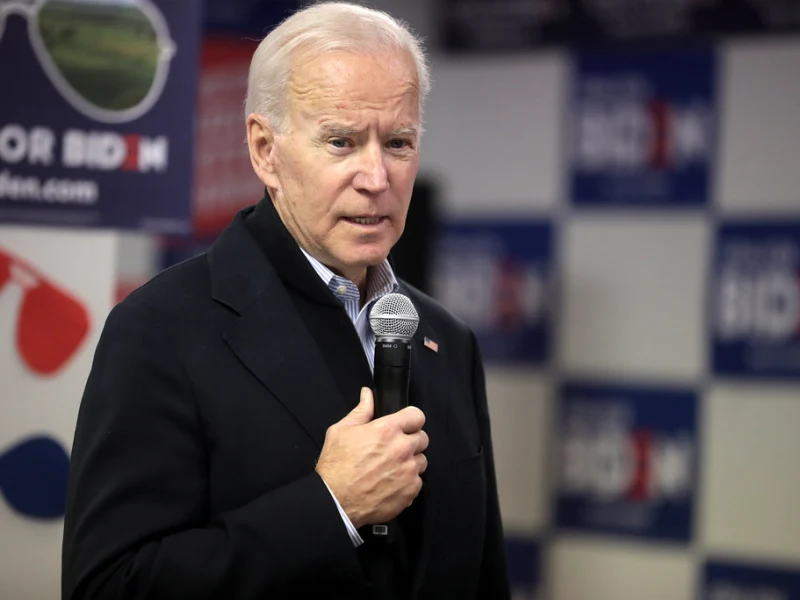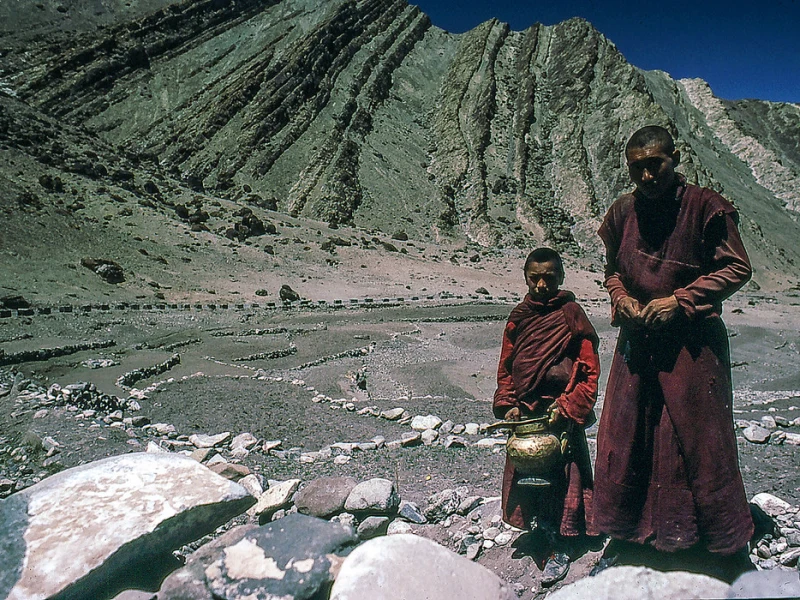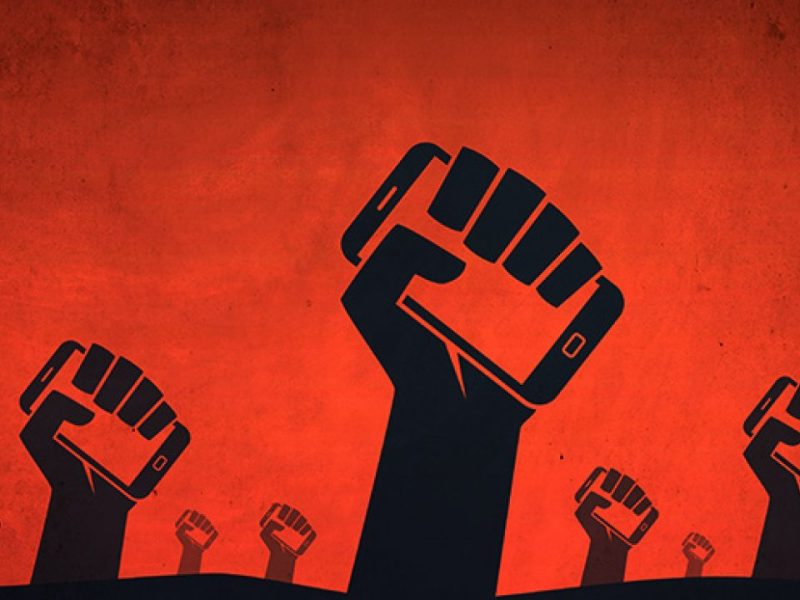Uniting Hindus or Masking Brahminism – Hindutva’s Narrowing Scope
Akanksha Mishra
This piece explores the argument of Hindutva as an ideology that unites Hindus across caste and sectarian lines, and the author explains how recent communal clashes show that Hindutva’s essence is Brahminical and upper-caste.
India’s Beef With Meat
Lakshya Sharma
Food, delicious? Think again, it is much more than what you eat. It is a symbol of identity, a carrier of culture, a link to ancestry, and a mark of pride. Growing from all this, food can also emerge as a locus point of polarization. It transforms from a symbol of care…
Dividing Karnataka
Maya Sharma
Over the past few months, the targeting of minorities appears to have become more widespread and on a range of different issues. And the BJP state government does not seem to be coming down as hard as it should on such blatant discrimination. Far from it.
How Does the Western Media Portray South Asia?
Shree Bhattacharyya
With the ongoing economic crisis in Sri Lanka, Shree Bhattacharyya does a deep dive into the representation of South Asia by the western media and inspects the neglect, possible biases, and lack of adequate coverage that may be seeping into media attention of South Asia.
Can India Afford to Make Hindi Its Sole Official Language?
Biplob Kumar Das
Amit Shah recently stated that Hindi should become the common language that different states communicate in, replacing English. While the statement has invited considerable criticism from the opposition, there is also a need to critically engage with such a proposal. Biplob Kumar Das writes the about the problems with enforcing Hindi as…
One for All or All for One? Equality in the Ukraine Refugee Crisis
Maahira Jain
The jarring difference in attitude and assistance provided to Ukrainians versus the Syrian refugees of 2015 continues to elicit questions of differentiation in treatment. How efficient and inclusive are the social welfare schemes offered by other countries?
Russia-India Oil Deal: A Question of National Interest or Morality?
Rutuparna Deshpade
Indian companies are buying Russian oil at discounted rates in light of a surge of prices in global markets. This move has become highly controversial, with some asking whether India can justify buying oil from the country that has started an unjust war.
On Russia-Ukraine, India is Boxed in by History and Geopolitics
Angshuman Choudhury
Russia’s invasion of Ukraine has thrown up a delicate diplomatic moment for India. New Delhi today finds itself awkwardly lodged between two major camps, both of which are crucial for its evolving geopolitical, regional and national interests. The net outcome has been India taking a firmly neutral stance on the invasion – neither…
What is Ukraine’s Best Bet?
Saaransh Mishra
While it is important to understand the roots of the invasion, pragmatically, the major concern right now is Ukraine defending itself against an indisputably mightier Russia. So, what exactly is Ukraine’s best bet?
Hindutva Beyond Politics: The Rise of an Alternate Pop-Culture in India
Biplob Kumar Das
Since 2014, India has not only witnessed the electoral and political rise of Hindutva, but also an evolution in popular culture that is much more committed to Hindu Nationalism. Industries like Bollywood and independent artists across YouTube are now producing art that espouses Hindutva sentiments.
Art Is Personal, the Personal Is Political, They Are Social and to Most Ephemeral
Vishnupriya Rajgarhia
From fall of the Berlin Wall to the rise of billionaire capitalists: how have world events decisively shaped the way we experience Art today?
Call of Duty: A Surgical Strike on the Discrimination in the Indian Army
Shree Bhattacharyya
With each march at the Beating Retreat, one can feel the echoes of generations of people who have selflessly served their country and continue to do so. However, among the assemblage of people who serve the country, there lie those who are grappling with their sexuality and are fighting to be recognised regardless…
Harvesting a Vote Bank
Biplob Kumar Das
Contesting on the backdrop of a successful year-long farmer’s agitation, the political parties in UP and Punjab have made several promises for farmers, ranging from MSPs to crop loss compensation and more.
1 Like = 1 Vote? Election Campaigning in the Time of Social Media
Ranjini Ghosh
How have limited characters online translated into landslide victories offline? An insight into the relevance of social media in election campaigning in India.
On the Fence: The Sino-Indian Standoff Continues
Shauryavardhan Sharma
After several rounds of violent clashes, official talks, and reformed policy measures, where is the future of Sino-Indian relations headed?
Morphing a Monument
Ujjwala Shankar
The decision to extinguish the Amar Jawan Jyoti at the India Gate elicited both admiration and outrage, but there might be problems with both reactions.
What Constitutes a Constitution?
Adit Shankar
A political tussle over the demand for a new constitution raises interesting questions about our relationship with the constitution, especially as it is increasingly perceived to be under threat. Open Axis explores this relationship.
RELOOK: Mukul Sharma on the Hindu right’s eco-politics, a decade later
K. Sivaramakrishnan Mukul Sharma in conversation with Professor K. Sivaramakrishnan in 2011, on his then new book Green and Saffron: Hindu Nationalism and Indian Environmental Politics.
How will China’s decision to stop funding coal overseas impact developing countries?
Anushree Pratap China is the largest greenhouse gas emitter in the world and has not pledged to phase out coal nationally. Anushree Pratap unpacks what its no new coal funding overseas means for emergent economies and global renewable energy.
When a people’s eyes are as moist as a land: The Tharu speak
Tisha Srivastav The Skin of Chitwan, an online multimedia exhibition by the Nepal Picture Library, gets inside a long history of dislocation, with a sensory, multidisciplinary vitality.
The Politics of a Climate Strike: Three Young Activists Talk Impact, Space, and Privilege
Ishita Ahuja
On September 25, FridaysForFuture called for a global climate strike, with Uproot the System as its theme, addressing climate problems faced by MAPA (Most Affected Areas and People). Ahead of the next strike on October 22, Ishita Ahuja speaks to three activists to understand the politics driving their protest.
A Climate-Friendly Autobahn Ahead For The Berlin & EU? Analysing Germany’s 2021 Elections
Aritro Sarkar
Aritro Sarkar discusses the growing tide of climate issues washing over electoral politics in Europe’s strongest economy, with three German voters.
What makes the News?
By Madhulika Agarwal
In this ever dynamic world, it often feels like multiple things are taking place simultaneously making it extremely difficult to keep up. But, with the overload of information available, how do the news outlets decide what to pick and what to leave behind? Who decides what makes the news?
The World ‘Wild’ Web and Why It Is No Place for A Woman With An Opinion
By Devika Goswami
As the pandemic strengthened our online presence, it also led to violence against women spilling over to online spaces. Women who use social media as a part of their jobs, such as politicians, journalists, activists, academics, celebrities and artists, routinely face harassment for openly expressing their views online. To what extent is…
Examining India’s Falling Rank on the World Happiness Index
Aanya Poddar
As the world is getting wealthier, it is also becoming increasingly unhappy. Talking specifically of India, it has just dropped down on the World Happiness Index released by the UN Sustainable Development Solutions Network. This article explores India’s relationship with its neighbors and the reasons for the observed trends on the happiness index.
100 Days of Biden
Karantaj Singh
The Biden administration has been highly optimistic by promising to meet an expansive agenda that includes controlling the coronavirus pandemic, enabling economic recovery, revising US climate policy and reviewing their health care system. Biden has also taken active steps to reverse Trump’s isolationist policies and decisions, alongside catalysing the process of restoring America’s…
The Cost Of Peace in Afghanistan
Akanksha Mishra
The rising violence by the Taliban in the past few weeks raises pertinent questions about its moderation and commitment to peace, as well as the U.S.’s priorities in Afghanistan. Should the U.S., in its haste to end the war, agree to a deal that will leave Afghanistan at the mercy of the Taliban,…
The Frailty of Quasi-Federalism in India
Saaransh Mishra
The structure of federalism adopted by India to tackle post-independence challenges appears to be compatible with the unitary agenda of the Central government. Additionally, the BJP’s majority forming the Centre and its recurrent tendencies to bypass state governments’ and its citizens pose an extreme danger to federalism, which is one of the basic…
Assam Assembly Election: Litmus Test for CAA and BJP
By Ridhima Manocha
After less than 18 months of violent protests erupting against CAA in Assam, Assam’s assembly elections are underway. While the BJP has remained tactfully silent on CAA, the opposition has made Anti-CAA sentiments a plank to rally against BJP. Will the Assembly election be a litmus test to show if BJP…
Vote Banking the Temple Beautification Drive
By Muskaan Kanodia
The drive to beautify temples might create history for the political parties and the government, but can it justify decades of individual and family histories that are simultaneously being erased from the cities?
Unpacking History: The Nexus Between Politics and Academic Freedom
Open Axis Staff
Time and again, the freedom of universities, faculties and students in places around the world has come into question by the state and has often been curbed through laws and regulations. In some instances, even violence has been used to clamp down on the freedom of these voices. This piece shall explore…
How Mamata’s Trinamool Broke The Glass Ceiling For Women In Politics
Gilles Verniers and Maya Mirchandani
While the Trinamool Congress sails ahead of its opponents on fielding women candidates, the relatively higher numbers of women in Bengal politics is part of a longer trend of gradual inclusion, to which more than one party has contributed.
The Power Under My Burqa — Sri Lanka’s Proposal to Ban the Burqa
Harshita Bedi Sri Lanka’s ruling government recently announced a proposal for banning the burqa as well as more than 1,000 Islamic schools as they are seen to propagate ‘religious extremism’. With a clear Sinhalese Buddhist majority within the country as well as the current ruling government, why are markers of the minorities like the burqa…
Politics of Postering – What the Walls Say in Tamil Nadu
Nandan Sankriti Kaushik
From larger-than-life banners, to small party symbols painted on walls along roads, these political references are a part of the states’ everyday life. It’s impossible to go anywhere without noticing a political symbol, a word of glowing praise emblazoned onto a wall, or the smiling face of a political leader.
Delhi’s Water Crisis: Not Just a Water Shortage Issue
Rohan Pai
At the surface level, the Delhi-Haryana water dispute might seem like a problem with a straightforward solution, but in reality it is riddled with legal and political baggage that pose a serious threat to the availability of water for Delhi in the future. It is the need of the hour for elected representatives…
University Spaces: Where the ‘Personal’ Becomes the ‘Political’
Ariba
Universities can be understood as spaces where “private lives of people come together as public.” That is, where the personal becomes the political. These resistance movements, therefore, necessitate academic freedom in universities. Without the freedom to read and express ideas that do not adhere to the boundaries defined by the status quo, it is…
India’s Fight Against a Pandemic Leads to an ‘Infodemic’ Targeting Minorities and the Poor
Maya Mirchandani
The COVID-19 pandemic brought with it large-scale paranoia and panic. Existing divisions within society were quick to worsen – at the core of which were poor and minority communities.
The Growing (In)Significance of the Nobel Peace Prize
Saaransh Mishra
Nobel laureates are meant to be harbingers of peace in this excruciatingly peaceless world that we inhabit. In order to set healthy precedents, the onus is on the Nobel Peace Committee to award this significant honour only to the ones that can leave a legacy for future generations to follow, and currently it…
Personal Lives and Private Bodies: The State’s Vested Interest in Heteronormativity
Rithika Abraham
In the midst of the ongoing hearings in the Delhi High Court about the possibility of legal recognition of same-sex marriage, the Central government released a statement declaring that non-heterosexual marriages have no basis in the Indian Constitution, and is, as such, against the ethos of the nation and its culture. The…
Evaluating the Implications of Privatization in India’s COVID-19 Inoculation Drive
Anjana Ramesh
India’s vaccination drive has witnessed considerable private sector involvement – from the development of vaccine candidates, to their mass-production. The recent announcement confirming the allowance of private distribution of vaccines has furthered this involvement. What implications does privatization of inoculation drives hold for India and its public healthcare capabilities?
Caste (In)Justice: Inadequacies in Addressing Gender and Caste Violence
Shreyashi Sharma
The law is brought to life by the human hand that upholds and implements it. If the human hand continues to be governed and conditioned by these structures of patriarchy and caste, then it is impossible for the law to be effectively applied in letter and spirit. How can such a law…
Alliance of new parties alone may not be enough: Mrinal Borah on Assam 2021
Jyotirmoy Talukdar
With Assam elections due in April 2021 and the first phase beginning on 27th March, various parties aim at defeating the ruling BJP- alliance in the state. Currently, Akhil Gogoi, an Assam activist who has been in prison for more than a year continues to strongly influence Assam politics. Jyotirmoy Talukdar and…
The Ineffectiveness and Brutality of Economic Sanctions
Saaransh Mishra
The rational logic behind sanctions is that since actors are concerned about economic outcomes, they would be compelled to commit to certain behavioral norms as a result of expression of official displeasure through sanctions. Yet surprisingly, in a landmark study spearheaded by economist Gary Clyde Hufbauer showed the success rate of sanctions at…
Power, Violence and The State: Can one exist without the other?
Rujuta Singh
The idea that the state should have control over legitimate violence is widely accepted around the world. However, with several incidences of police brutality in the past year, this power is beginning to be questioned. Do states use violence to legitimize their sovereignty, and should this power be curbed?
The Biden-Harris Campaign: Representation or Presentation?
Madhulika Agarwal
Kamala Harris is widely popular for being one of the most progressive US politicians right now. She goes by the nicknames “Top Cop” and “Progressive Prosecutor”. According to her campaign, part of this “progressiveness” comes from the fact that unlike her colleagues, she is neither white, nor male. But, is that all that…
‘It’s only words’ – The Normalisation of Hate Speech
Purnima Mehrotra
Until recently, Love-Jihad was just another popular phrase used as hate speech. But with it now having informed the creation of unimaginable divisive and intrusive marriage laws, it is time to reexamine the impact of this vitriol on our lives. Is hate speech just that — only words? Or is it something much…
Understanding the French Principle of Laïcité
Shrishti Agrawal
While the principle of laïcité was intended to instill secularism in France, it was created at a time when the French Constitution did not need to worry about the practices of many religions. Although the complete removal of religion from public spaces may have worked in the past, growing religious and cultural tensions…
The compass of war is centered right at home.
Sanya Chandra
While aerial surveillance may hint at the future of warfare, it also hints at the future of humanity. Drones reveal how.
Bidenomics For America and The World
Karantaj Singh President elect Joe Biden seems to have very different views from President Donald Trump on most socio-political issues, and his economic policies seem to be very different as well. So what will Bidenomics mean for America and the world?
Family Law: UAE’s New Marketing Strategy
Karantaj Singh ‘Progressive’ isn’t the first word that comes to mind when speaking about the Middle East. But the recent changes made in the UAE family laws, shows that the country is adapting to norms of the 21st century.
Breathe Again
Maya Mirchandani
America breathes a sigh of relief and joy on the election of Joe Biden and Kamala Harris as President and Vice President elect, narrowly defeating incumbent President Donald Trump. But what does the path forward look like in a country with deep fissures made apparent in the election?
China’s Vaccine Diplomacy: Strategic Ascension to Global Power?
S D Sreeganga Arkalgud Ramaprasad
Take a look at how Covid-19 vaccine diplomacy may pan out in the midst of the current pandemic.
How a Jailed Activist Continues to Influence Assam’s Politics: Conversations Regarding Akhil Gogoi
Jyotirmoy Talukdar How has Akhil Gogoi continued to remain one of the most relevant figures in Assam’s politics even today?
Putting Civil Society In Its Place
Ingrid Srinath
The government seemed to appreciate civil society’s humanitarian response to the pandemic, but the recent amendments to India’s Foreign Contribution Regulation Act are ill-conceived, ill-timed and probably ill-intentioned. What explains this contradiction?
Everyday Forms of Geopolitics
Swargajyoti Gohain
We think geopolitics is all about international politics, where nations and national governments are involved. Yet, geopolitics can also shape the personal and social lives of individuals and communities. The geographical location of the border influences decisions about marriage, local elections, commercial exchanges, cultural expressions, regional unities and transnational affiliations.
Forget the Rhetoric: India cannot be the next China!
Karantaj Singh
It is going to take a lot of planning, spending and sacrifice if India is going to even be a contender for becoming the world’s factory. The country has abundant raw material and a mammoth working population, but falls short on investments and planning.
Tanishq: Victim of an uncontrollable beast
Anant Rangaswami
After being bashed on social media for promoting ‘love jihad’, jewellery brand Tanishq took down their advertisement depicting an inter-faith marriage. A look at the process of news generation and its use of social media shows that this controversy is not a one-off event, but part of a larger systemic problem.
Do Social Media Protests Amount To Anything In India?
Isha Deshmukh
#DalitLivesMatter is the latest in a series of Indian hashtag protests. But these hashtags are temporary as is the memory of the event that spawned them. Online social movements are more popular than ever. What challenges does India face in adopting these movements? Do they have a lasting impact or are they simply…
Liberalization at the Margins in Hard Times
Bann Seng Tan
Trump’s America First doctrine is considered as an invalidation of the United States’ commitment to democracy promotion. However, Trump does not represent a fundamental break in US foreign policy. There is no Golden Age of democracy promotion to harken back to.
Culture Wars: When Private Goes Public
Deep Vakil
The revolution of social media in culture wars has been likened to that of industrial weapons technology in conventional warfare. Some of the strategies and tactics deployed are justified by inflating the political stakes to such an extent that no means seem morally unjustified.
Humans v. AI: How automated decision making is a game changer for legal liability
Arushi Massey
What can the self-driving car crashes teach us about ethics and responsibility in the digital age? Are the trends shifting legal liability away from Big Tech? Can the State regulate? The intersection of law and technology poses new problems for moral philosophy, legal scholars and regulators. Product Liability may hold the answer.
Am I my Map? Cartography and Reworking Identity
Sanya Chandra
Cartography creates an ‘India’ on paper while simultaneously conversations, laws and political mechanisms create the ‘Indian’ in our minds. While robust borders and stagnant maps reinforce security, should we be conscious of them?
Bringing The Boys to Life in Trump’s America
Karantaj Singh
Blonde hair, white male, cheeky smile, self-obsessed, xenophobic, erratic, and a public image built over love for his country. Is Homelander Donald Trump in a cape?
To End or Not to End Privacy
Debayan Gupta
Should governments be given a key to encrypted software? Can we manage to keep this key hidden from hackers? Let’s explore the role of encryption in the privacy and security of our digital lives.
Give Me Liberty, COVID, or Cow Urine
Isha Deshmukh
COVID-19 has already claimed more than a million lives. Despite the very real threat, people continue to politicise the virus, deny it and spread baseless facts and treatments. What has happened to our scientific temperament in a time when we needed it most?
A Vote for America’s Soul
Aditya Burra
Ever since Trump became President, the international reputation of the United States seems to be in free-fall. During the elections in November, what all is at stake?
Phones and Guns to Phones with Guns: Am I a Soldier?
Sanya Chandra
Do you ever think how many ways the state is in your home, or on your phone, quite literally hugging your person? Do you think your means of entertainment are detached from diplomatic posturing? If the answer is yes, you are wrong.
COVID or Not, The Campaign Must Go On
Neelanjan Sircar
In the aftermath of the COVID-19 pandemic, parties will be heavily restricted in hosting rallies or other large public events that are so crucial to a standard political campaign. But the campaign must go on.
When should I stop watching the news?
Siddhartha Dubey
TV news has become a platform for lies and propaganda. If Indian news television is hurtling down an abyss, should we follow?
Here’s the Truth: We Believe Misinformation Because We Want To
Pravish Agnihotri
Why does misinformation spread, even in the face of hard evidence? Interactions between our socio-historical context, our psychology, and business models of social media companies might hold the answer.
My Son’s Inheritance: India’s Invisible Violence
Aparna Vaidik
The book demonstrates how violence is secretly embedded in our myths, folklore, poetry, literature, and language, and is therefore invisible. Framing my narrative as a message to my son, I acquaint him with his ancestors—those who abet and carry out lynching as well as those who are lynched.

